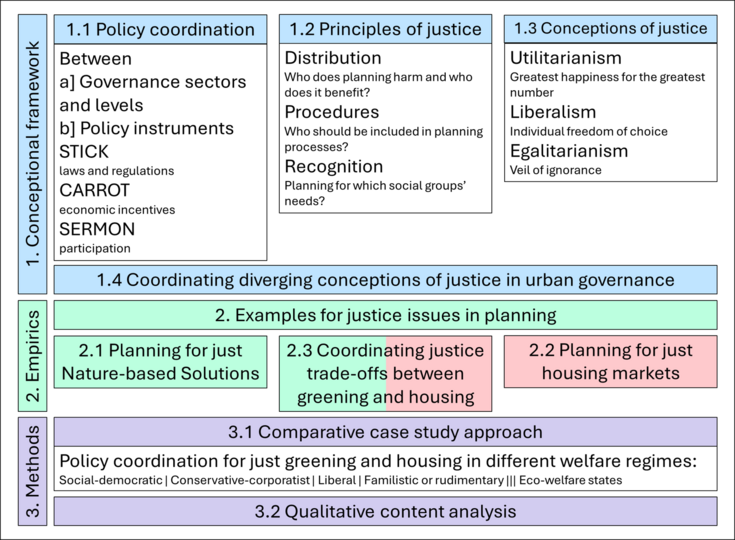Coordinating justice. Urban governance between climate adaptation, affordable housing and justice trade-offs
SUPERVISOR: Thomas THALER
PROJECT ASSIGNED TO: Mark SCHERNER
In light of a growing risk perception of climate change, cities in different European welfare regimes shift their planning strategies towards climate change adaptation, like Nature-based Solutions (NbS), and therefore environmental justice. In turn, these environmentally just solutions can lead to social inequality. In terms of justice in planning, this PhD asks whether eco-welfare states could be an approach addressing complex issues of justice and equality in governing greening and housing.
Research on environmental justice, as well as studies on green gentrification highlight how the positive and negative impacts of urban green spaces are unequally distributed socially across socioeconomic groups and spatially across cities. The literature on housing welfare indicates that the right to housing varies according to the accessibility and affordability of housing. Therefore, depending on housing welfare regimes, environmental justice may lead to increasing risks of injustice, like socio-spatial trade-offs. Yet, the debate on eco-welfare states indicates the necessity to green the housing stock and its environment while maintaining affordability.
In urban governance, there are perpetual conflicts of risk awareness of greening and housing issues, and underlying conceptions of justice. In the interplay of policy coordination, this PhD assumes that the perception of urban risks varies considerably between governance sectors, like greening and housing. Institutions in sectors of greening and housing often resolve justice only within their jurisdictions and ignore the respective institutions’ justice issues. At times, policymakers cooperate or compensate each other. However, it is less known whether this is also the case for eco-welfare states, e.g., social housing and anti-gentrification policies in times of climate change.
Therefore, this PhD will examine how conceptions of justice behind greening and housing policies are coordinated. Based on a literature review on justice in planning, first, this PhD will provide a theoretical contribution to ongoing debates on conceptions of justice (Utilitarianism, liberalism, proportionality, egalitarian and capability, prioritarian) with regard to policy coordination. Second, a comparative case-study approach is adopted to disentangle the coordination of justice in different settings of both urban governance and housing welfare. The two comparative case studies (Oslo-Vienna and London-Vienna) use qualitative methods to obtain discursive information about conceptions of justice behind policy instruments and compare these conceptions with local risks of climate change and housing issues.
In summary, this PhD aims to contribute to ongoing debates on eco-welfare states in urban governance by conceptualising the coordination of justice of both governing NbS and housing in times of climate change.

Research Design
